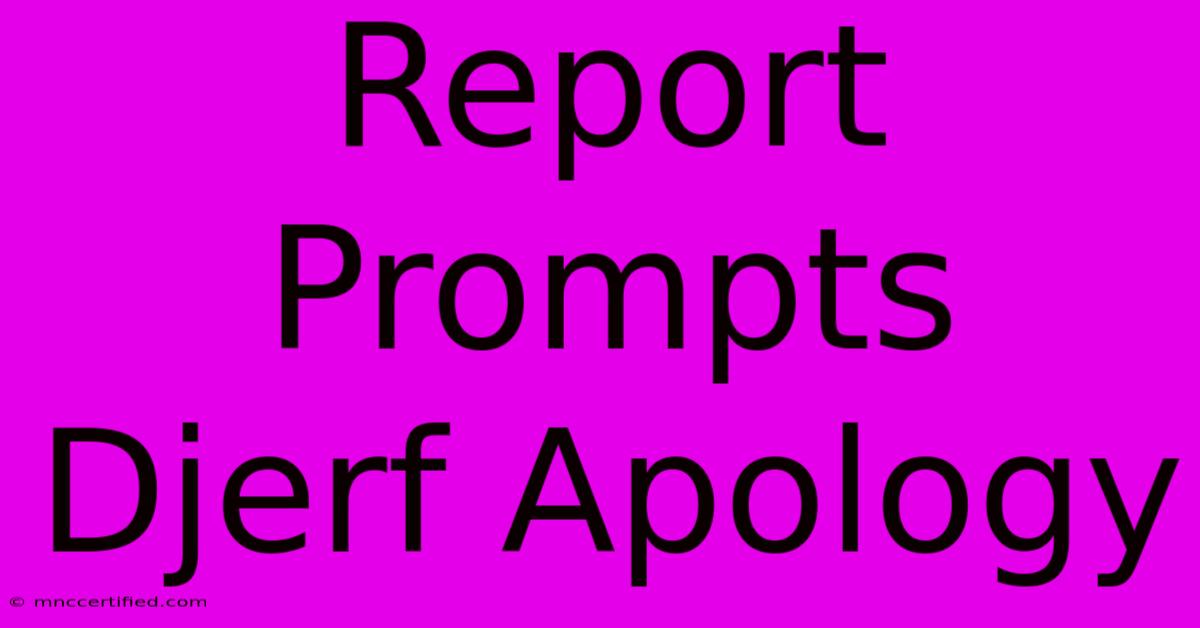Report Prompts Djerf Apology

Table of Contents
Report Prompts & the Djerf Apology: Navigating Influencer Controversy
The influencer world, while glamorous on the surface, is often fraught with controversy. Recent events surrounding the Djerf Avenue brand and its founder, Matilda Djerf, highlight the importance of responsible content creation and the power of prompt reporting. This article delves into the specifics of the situation, explores the nature of "report prompts," and offers insights into navigating similar controversies effectively.
Understanding the Djerf Apology Situation
Matilda Djerf, the face behind the popular Djerf Avenue brand, recently faced significant backlash due to allegations surrounding her business practices and public image. While the specifics of the criticisms vary, they centered around perceived inconsistencies between her online persona and reality. This led to a substantial number of users employing "report prompts" – pre-written reports designed to quickly and efficiently flag content deemed problematic.
The resulting controversy prompted a public apology from Djerf, addressing some of the criticisms leveled against her. This event serves as a valuable case study in how quickly influencer narratives can shift and the impact of online accountability.
What are Report Prompts?
Report prompts are pre-written reports, often shared across social media platforms, designed to streamline the reporting process for problematic content. They typically include a concise description of the violation, potentially referencing specific platform policies, and aim to expedite the review process by providing a clear and structured report. They're frequently used to address issues like:
- Misinformation: Reporting false or misleading information.
- Harmful content: Reporting content that promotes hate speech, violence, or self-harm.
- Copyright infringement: Reporting content that uses copyrighted material without permission.
- Brand impersonation: Reporting fake accounts posing as legitimate brands.
- Ethical concerns: Reporting actions that contradict an influencer's purported values or create misleading perceptions. (As seen in the Djerf situation)
While report prompts can be a useful tool for flagging potentially harmful content, it's crucial to use them responsibly and only when justified by platform policies. False reporting can have consequences.
The Impact of Social Media Accountability
The Djerf Avenue situation demonstrates the increasing power of social media accountability. Influencers are no longer immune to criticism; their actions and statements are scrutinized by a vast and connected online community. This level of scrutiny can lead to:
- Increased transparency: Influencers may be more inclined to be honest and transparent about their brand practices.
- Improved ethical conduct: Pressure from the online community can encourage more ethical and responsible behavior.
- Faster resolution of issues: Report prompts and public criticism can expedite the resolution of conflicts and address problematic situations more swiftly.
- Greater accountability: Influencers understand that their actions have real-world consequences, impacting their brand reputation and future collaborations.
Navigating Influencer Controversies: Best Practices
For both influencers and consumers, navigating controversies effectively requires a nuanced approach.
For Influencers:
- Transparency and honesty: Openly addressing concerns and admitting mistakes builds trust.
- Proactive communication: Addressing issues promptly and directly minimizes negative impact.
- Authenticity: Maintaining a genuine online persona reduces the likelihood of future controversies.
- Responsible content creation: Prioritize ethical considerations in all aspects of content production and brand management.
For Consumers:
- Critical thinking: Don't blindly accept everything you see online. Question claims and seek multiple perspectives.
- Responsible reporting: Only use report prompts when genuinely justified by platform policies.
- Constructive feedback: When providing criticism, focus on specific behaviors and offer suggestions for improvement.
Conclusion: The Future of Influencer Responsibility
The Djerf Avenue case serves as a stark reminder of the evolving landscape of influencer marketing. The use of report prompts, while controversial in some cases, highlights the increasing power of online accountability and the demand for greater transparency and ethical behavior from influencers. As the industry continues to evolve, responsible content creation and genuine engagement with audiences will be key to long-term success and a positive online presence. The ability to navigate controversies effectively will be a crucial skill for both influencers and those who engage with their content.

Thank you for visiting our website wich cover about Report Prompts Djerf Apology. We hope the information provided has been useful to you. Feel free to contact us if you have any questions or need further assistance. See you next time and dont miss to bookmark.
Featured Posts
-
Adidas Lillard Ink Lifetime Pact
Dec 19, 2024
-
Thames Dog Rescue Jordan North Hailed
Dec 19, 2024
-
Caras Elton John Christmas Look
Dec 19, 2024
-
Peter Wrights Major Prediction Retirement Imminent
Dec 19, 2024
-
Cheney Under House Gop Scrutiny
Dec 19, 2024